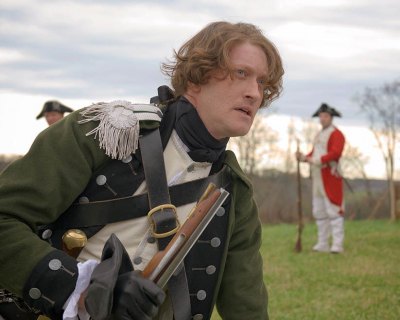
As written by the show’s creators and portrayed (brilliantly) by veteran stage actor Samuel Roukin, Simcoe can only be described as a calculating, blood-thirsty sociopath.
But in keeping with our promise to offer resources to help fans of the show sort out fact from fiction, here are articles that offer a fuller view of the historical Simcoe (1752-1806).
Beginnings: He was born in Cotterstock, England, in 1752 and attended prestigious schools, including Oxford University, according to Encyclopedia Britannica online.
Revolutionary War: From 1777-81 he commanded the Queen’s Rangers and by 1778 was promoted to lieutenant colonel. He was taken prisoner in 1779. Henry Lee, commander of the Continental Army’s 2nd Partisan Corps, described Simcoe as a worthy adversary: “a man of letters, and, like the Romans and Grecians, cultivated science amid the turmoil of camp. He was enterprising, resolute, and persevering; weighing well his project before entered upon, and promptly seizing every advantage which offered in the course of execution.” See: Journal of the American Revolution, The Partisan and the Queen’s Ranger, by Benjamin Huggins, assistant professor and editor at the Papers of George Washington project at the University of Virginia.
Run-in with the Culper ring: In the book upon which the television series is based, Washington’s Spies, The Story of America’s First Spy Ring, Alexander Rose writes that Simcoe was on the trail of Abraham Woodhull, a key spy in the ring. In a letter written in 1779, Woodhull explained that he was in New York at the time. Finding the spy gone, Simcoe "fell upon my father and plundered him in the most shocking manner."
The massacre: In 1778, 1,500 British troops and loyalists under Gen. Charles Mawhood were foraging for food. They met with resistance from militia and patriots in Salem County, New Jersey, according to the website for the New Jersey Division of Parks and Forestry. Frustrated, Mawhood ordered his troops to “Go -- spare no one -- put all to death -- give no quarters.” In the early morning hours of March 21, 1778, Simcoe and 300 troops attacked Hancock House, where the local militia was stationed. Everyone inside was bayoneted, the website recounts. Ten were killed, and five were wounded.
As a politician: After the war, Simcoe served in Parliament. In 1792, he arrived in Canada and became lieutenant governor of upper Canada (Ontario). In this position, he declared slavery illegal, granted land to American settlers and laid the foundation for the road system, according to Historica Canada, the online Canadian encyclopedia. He died in 1806 in Exeter, England.
Different perspectives: Rose describes Simcoe as “another one for wanton brutality,” allowing his men to break furniture and burn the library of a reverend whose home had been commandeered. And there was more -- a Quaker meetinghouse was converted to a commissary and arsenal, residents had a curfew, boards from the town churches were used for firewood. Rose concludes that Simcoe “exemplified the worst aspects of the British army and the British army in Long Island represented everything the Patriots were struggling against.”
For another perspective, read this article on Simcoe on the Den of Geek website by J.L. Bell, associate editor for Journal of the American Revolution. He argues that the incident at Hancock House was “within eighteenth-century rules of warfare,” and that as a politician, Simcoe was forward-looking.
Sources:
- Encyclopedia Britannica: John Graves Simcoe, British statesman.
- Historica Canada: John Graves Simcoe.
- Journal of the American Revolution: The Partisan and the Queen's Ranger, by Benjamin Huggins.
- New Jersey Division of Parks and Forestry: Hancock House.
- Washington’s Spies: The Story of America’s First Spy Ring (Bantam; 2006), by Alexander Rose.
- Den of Geek -- AMC's Turn: The Real Story of Captain Simcoe, by J.L. Bell.
Related:
Fact, fiction and 'Turn,' the Colonial spy drama
'Turn' serves up revolutionary history
If you would like to comment, give us a shout, or like us on Facebookand tell us what you think.